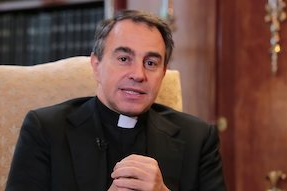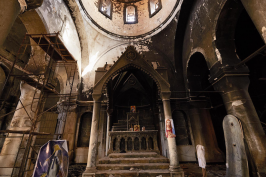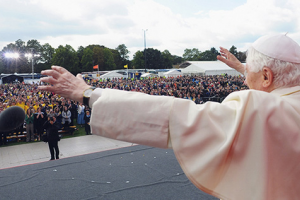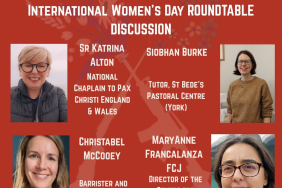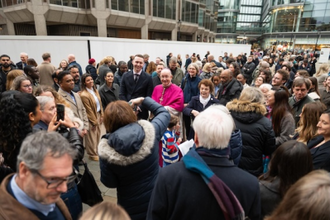Papal Visit - Thoughts from a Laywoman
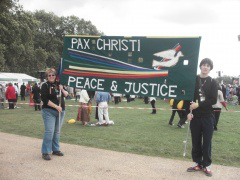
Banner at Hyde Park
I was glued to the TV for four days. As the papal programme in Britain worked through it felt like reality was being redefined! The main news channels were dominated by pictures of Pope Benedict's sweet smile, yellow and white flags, discussion about the role of Christianity in society, and all with familiar hymns playing in the background. What a relief that the Pope's visit has passed so well - what stamina he has and what rapport with crowds, what awesome arrangements had been made for the big events and what a welcoming public response. May I congratulate our bishops and all the organisers, and offer the following thoughts.
My first reflection would be that we Catholics have shown our deep love of celebrating our community and our faith. In the leadup to the Bellahouston Mass in Glasgow, as thousands of all ages poured into the park, journalists expressed surprise at the joyful atmosphere which, one said: "many of us don't associate with religion". Catholics yearn to feel part of the wider Church community outside their parish or school, and Pope Benedict's visit provided that opportunity. Bellahouston and Hyde Park felt like Catholic Glastonburys on golden evenings and the appearance of a rainbow just as the Cofton Park Mass started seemed to affirm the loving relations between God, humanity and the natural world. I would flag up the tremendous faith and loyalty of the Catholic laity in the UK. As Cardinal Newman famously told a bishop: "where would we be without them".
Two of my sons and I attended the Hyde Park vigil, sitting with young people from Hexham and Newcastle Diocese who had travelled all night in a coach to be at Westminster at 7am, then travelling home overnight again. Following a media battering in the lead up to the visit, tens of thousands took to the streets to support the Pope and our bishops and full credit should be given to the laity for this, and for the role played in helping run the big services smoothly.
Of course, many of us had sympathies with various protestors, particularly the victims of abuse by clergy and their outrage at Church cover ups. Clearly, regret is insufficient - however heartfelt. In interviews, victims told their stories and called for Church resources to be given to their support groups and for the Vatican to provide files to the police for full investigation of cases that reached them over the decades. Why hasn't this happened already? Has the culture which allowed it to happen now changed? Thankfully, Pope Benedict called for sufficient victim support in his final address to bishops before leaving, but it is a pity that in his moving apology at the Westminster Cathedral Mass he used the term "unspeakable" to describe the crimes. They must be spoken about openly if the victims are to have any chance of healing, and if institutional factors which may be relevant are to be openly discussed, such as compulsory celibacy and patriarchy. The church's commitment to the vulnerable and its claim to be a moral authority demands this.
Altar girls were prominent at the papal masses and the welcome to the meeting with religious at St Mary's, Twickenham, was given by a woman. And an aspect of the Hyde Park vigil I enjoyed was seeing the Pope surrounded by young women - at least that is how it appeared on the large screens because the other clergy were beside him rather than behind. He couldn't help this. But at Lambeth Palace he chose to greet very warmly not only Archbishop Rowan Williams, but his wife too, and again at Westminster Abbey an Anglican woman priest. The graciousness of the greetings impressed those of us who have shared the hurt of Catholic women who have vocations to the ordained priesthood and Catholic priests who have married. Married Anglicans who have smoothly slipped into Catholic priesthood, accompanied by their wives and children, prove that sea-change can come about sometimes sooner than we think possible. The Pope's visit has certainly made the life of Cardinal John Henry Newman better known and his famous toast that he would drink "to conscience first, and to the Pope afterwards" will probably inspire further prophetic and loving witness within the church on contentious issues. Pope Benedict, at least, has shown an ability to be flexible and open that has surprised and impressed many.
The pope's key theme on this visit was a warning about "aggressive secularism". The term was first used in his opening speech in Edinburgh and was picked up again in his address in Westminster Hall. Whilst understanding completely what he means, there is danger in labelling Britain a secular society because we come to believe it ourselves, and to become intimidated by the challenges of the most vocal opponents of religion, however few they are. I find my sons' young university friends not antagonistic but baffled about what religion is for, and its relevance to the modern world. Would the images they have seen this past week stimulate a more positive response? I'm not sure. Were they interested enough to watch them? I don't know. The impact will only be clear over time. And I believe it is important to respect not just people of other faiths - whose representatives the pope met - but people of seemingly no faith who work for the common good. I would have some sympathy for those atheists who complained about the pope linking atheism with wickedness. In recent years, I have worked with environmental activists who don't appear to be motivated by faith, but have sensitivity to the degradation of the natural world, to what we Christians call God's creation. And I have been astounded at how many of them take inspiration from the work of creation theologian and priest Thomas Berry, who is largely ignored in the Catholic world. The earth-inclusive spirituality of his work speaks to their hearts, and this is clearly a significant meeting place between religious and secular worlds that receives little attention from the institutional church. We must be open to dialogue with everybody.
Some of us felt rather bemused that Tony Blair - after helping launch an Iraq War that the Vatican condemned - was prominent at several events. But this was a time for building bridges. And I suppose it would be too contentious for Pope Benedict to have underlined the Vatican's opposition to nuclear weapons just as Britain is debating the renewal of Trident. It was wonderful to hear the Pope celebrate Catholic education and express interest in working with the British Government on the issues such as international development and climate change. The Church's Social Teaching and action on it was certainly showcased on this trip.
I thought it a great pity that some of the fresher liturgy and presentations happened at events before the pope arrived at them. This meant not only that the pope missed them but that they largely lost out on media coverage. At Hyde Park, for example, we were treated to dance and theatre work by people with special needs and minority groups, witness presentations by the Mizen family and others (which received standing ovations), and examples of Catholic projects in UK assisting asylum seekers and homeless young people. I was particularly impressed by a CAFOD presentation, 'A heart that sees, a heart that serves, a heart that seeks justice' which showed the amazing extent of Catholic initiatives addressing poverty and need globally. After it the 80,000 people present were invited to stand and send a positive message to the UN in New York to support deliberations on the Millennium Development Goals, and we did it enthusiastically. The pope might have really enjoyed this and it would have impressed anybody outside the Catholic community present had they seen it, as would the procession of banners from a great variety of groups within the Church which were greeted by bishops lined up on the stage. Yet, the quietness of the Exposition of the Blessed Sacrament when the pope did arrive was a treasured moment too - you couldn't hear helicopters or traffic; it was truly silent as hundreds of candles were lit and the light shared. It was very affirming for people who work in the area of justice and peace to hear the pope say here that: "each of us is called to change the world, to work for a culture of life".
So, activity in a greatly invigorated Church in Britain will get back to normal, but we will feel an on-going warm glow when thinking about this papal visit. I would take issue with the TV commentator who said during the photo session of British seminarians with the pope that, "these are the young men who will carry the mission of the church forward". I'm sure they will, but that is a responsibility for all of us. David Cameron, in his generous farewell speech on the runway at Birmingham Airport, told Pope Benedict: "we can all share in your message of working for the common good and we all have a social obligation each other, to our families and our communities". It was a day when we could feel hopeful and proud of our church and of our countries in the UK.



